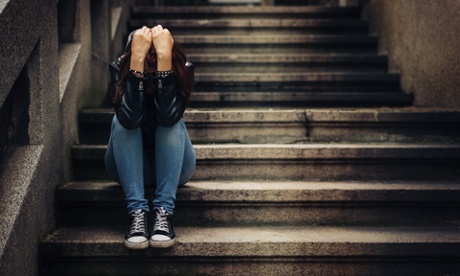
Almost half of British girls aged 17 to 21 have needed help with their mental health, according to findings published today from the Girlguiding 2015 girls’ attitudes survey. The results suggest that mental wellbeing is a major area for concern, with worries starting from as young as seven and escalating as girls get older.
Self-harming tops a list of health concerns for girls aged 11 to 21, closely followed by smoking, mental illness, depression and eating disorders. The results suggest that these concerns have changed dramatically over the past five years. In 2010, girls’ top three health concerns were binge drinking, smoking and drug abuse.
According to mental health charity YoungMinds, between 2001 and 2011 there was a 77% increase in hospital admissions of women under 25 due to self-harm.
The Girlguiding results also suggest that girls may be struggling to find the support they need, with 82% saying adults don’t recognise the pressure they are under and two-thirds of girls aged 17 to 21 saying mental health is awkward to talk about.
I asked Girlguiding advocate Emma Gees, 24, who helped to develop the survey, why this might be. She told me:
There are many contributing factors at play. The world has changed an awful lot in the last 10 to 15 years for children, and there are so many different pressures – pressure to do well at school, pressure to look a certain way, sexual harassment, sexual pressure – they create the perfect storm.
I also think things like social media can play a big part. When I was at school, we didn’t have smartphones, so we could switch off, but now you’re constantly switched on and people are pressured to have a certain persona. I think mental health is a serious issue for girls and boys, but people can be particularly nasty to girls online and, with the pressure to look a certain way in particular, it can be really damaging.
Sexual objectification of women in the media suggests girls are meant to look a certain way and do certain things. If a girl carries a condom, she’s a whore, but if a guy carries one, he’s a stud. There are so many double standards, and girls are confused about what to do and how to behave, and they don’t know where to turn for advice and help.
The survey, which polled 1,500 girls and young women, suggests that worries over sexual harassment and low body confidence are taking their toll on girls’ wellbeing; three-quarters of girls say anxiety over experiencing sexual harassment negatively affects their lives in some way, from what they wear and where they go to how they feel about their bodies. In the past week alone, almost 40% of the girls surveyed had had a demeaning comment made to them about their looks.
Girlguiding advocate Katherine Bradfield, 18, said: “Girls are battling adversity at every corner – because everyday sexism and harassment remains a constant, unwanted presence in our lives. Now we see the damaging consequences of these pressures, as they take their toll on girls’ mental wellbeing.”
The good news, says Gees, is that there are lots of steps we can take to try to deal with the problem.
We need to help children to have more resilience and cope in the face of challenges. It would help to open up discussions so people are happy to talk about mental wellbeing and health. There’s so much stigma attached to it that people can’t talk about it until it’s too late and they’ve reached breaking point.
We also need to have these discussions in a safe environment where girls can ask the questions they can’t ask anywhere else. I think it should be part of the curriculum and people like teachers and frontline staff should have training to know how to talk to young people about these issues.
And in order for girls to be fully supported, that training, Gees believes, needs to include an understanding of societal double standards.
At a school near me, there was a sexting incident, and when the photos were spread around the teachers suggested she shouldn’t have taken the pictures in the first place instead of dealing with the crime.
In visits to schools up and down the country I have met with teenage girls who use the same phrase over and over again: “we can’t win”. They feel pressured to walk an impossible line between being sexy enough without being branded a slut. They are growing up in a world of online porn, sexting and smart phones that sees them pressured to share explicit pictures and videos, but any leak of such material can lead to extreme bullying and accusations that they are a ‘whore’ or a ‘slag’, while the boys involved are labelled lads and players.
These worrying survey results point to an urgent need to update adult thinking to catch up with the reality of teenagers’ lives. We need to be having frank, open conversations about issues like mental health, consent and sexism with young people of all genders. For young men too, the message that it isn’t shameful or weak to reach out for help with mental health is essential.
As Gees says:
Girls are whistled at and shouted at in the street in their school uniforms; it’s just another pressure that makes them conscious of how they’re looking and what they’ve done to get that attention. In fact, it’s not about what they’ve done at all, but they don’t have the confidence to challenge it. What kind of a world is that?

